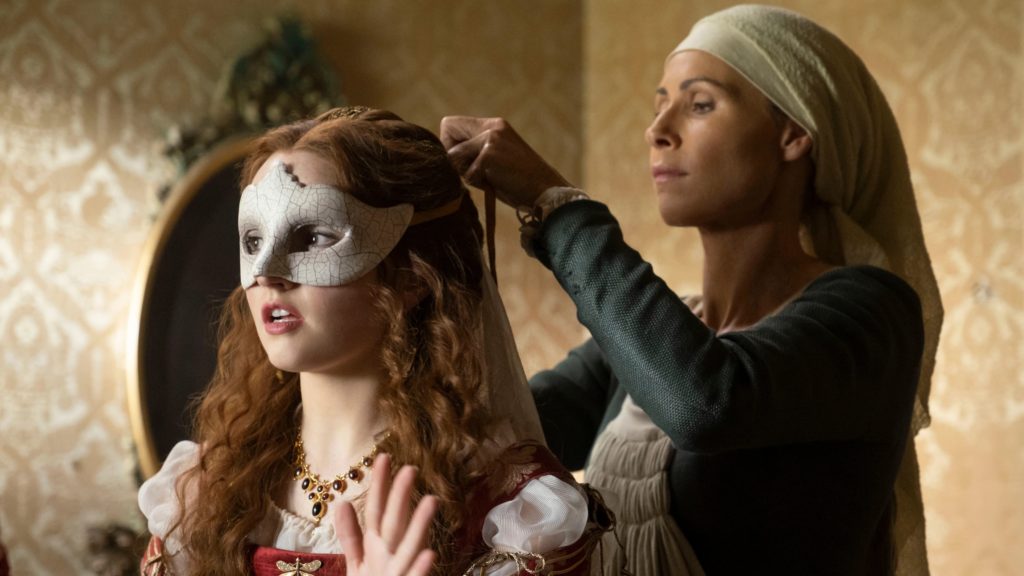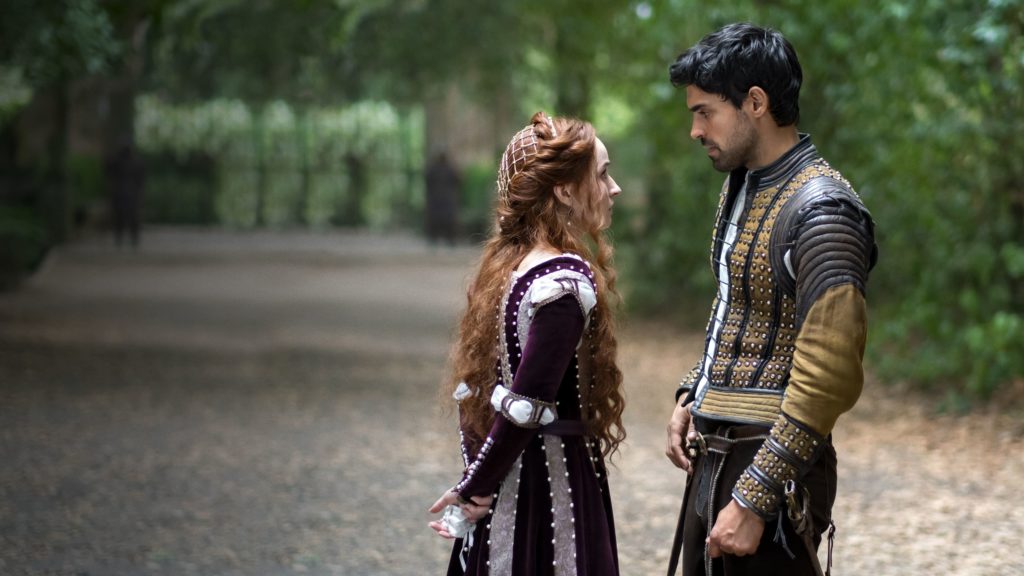The problem with Rosaline is also the very premise. This is Romeo and Juliet from a different perspective. It can give us dramatic irony and twists on familiar moments, but it is bound by the broad strokes of that story. Not just that, but it’s bound to show us many of those moments, or else it can’t even tell its story. Thus, we’re stuck with perfunctory recreations of moments that have been filmed far more grippingly in the past.
Perhaps the structure could have worked if the rest of Rosaline were clockwork, but it isn’t. The version of the story, as it’s told here, is that Rosaline (Kaitlyn Dever) is secretly dating Romeo (Kyle Allen), when he falls for her cousin, Juliet (Isabela Merced). The more worldly Rosaline offers to give virginal Juliet some dating advice in an attempt to sabotage their relationship and get Romeo back. This opening of the film is the film’s strongest section, as it gives the story the most to do outside of the strictures of the classic play.

Meanwhile, Rosaline’s father (Bradley Whitford) is constantly pushing suitors on her, which she finds increasingly erratic ways to alienate. She keeps bumping into one of those gentlemen, Dario (Sean Teale). It’s not a surprise when sparks fly between them, but it’s a bit of a disappointment that those sparks aren’t more frequent or fiery. Teale isn’t bad, per se, but his chemistry with Dever and the watered-down and formulaic enemies-to-lovers romance arc are halfhearted.
The film keeps the Verona setting but gives its characters contemporary American dialogue the majority of the time. It’s essentially a snarky teen comedy. This tone itself isn’t a problem, and it even creates some amusing dissonance with the source play. Some of the movie’s funniest moments are eye-rolling mockery of the more ridiculous plot turns and lines from Romeo and Juliet. What is a problem is that the script simply isn’t sharp or funny enough — few of the gags land with little more than a chuckle.
The film’s second half forces us to follow Rosaline on the fringes of familiar Romeo and Juliet scenes, and there are a few enjoyable subversions. My favorite is reimagining Paris (Spencer Stevenson) as a co-scheming gay best friend of Rosaline’s. Minnie Driver is also excellent as a powerhouse Nurse. Alas, just about everything else is a bust, none worse than the movie’s reinvention of the play’s final Act, the death of the teen lovers, which is cringe-inducingly corny and unfunny.

The biggest thing going for Rosaline is the performance by Dever of the title character. Dever manages to pull all the disparate objectives of the film into a coherent performance. So even as the film, e.g., bungles the attempt to add some girl-power feminism to the beloved play, it still more-or-less feels anchored by Dever and her exasperated wit.
From a production perspective, this is above-average streaming fare. It’s a far cry from prestige, but the lighting has some genuine depth and vitality to it, and the costuming is quite good. The film follows the lead of Bridgerton showcasing a peppy orchestral score that includes arrangements of anachronistic pop songs, like Taylor Swift.
I’m not sure what a truly successful version of Rosaline would look: probably a bit more steam in its romance and bit less beholden to the Bard. It’s breezy and watchable PG-13 teen comedy, but never rises into anything special.
- Review Series: 2022: Year in Film
Is It Good?
Not Very Good (3/8)
Dan is the founder and head critic of The Goods. Follow Dan on Letterboxd. Join the Discord for updates and discussion.


2 replies on “Rosaline (2022)”
My understanding is that this film was based on a young adult novel set in the modern day, which the production team decided to bring back to Shakespearean Italy without actually altering most of the dialogue.
Bless them, they absolutely knows what they were doing and they were quite right to do it: I’d have suggested making a few nips and ticks to a turn of phrase or two (‘Minstrels’ would have been just as funny as ‘Boy band’ and more period correct) but using modern language allows us to understand – with a pitiless clarity – that the play’s protagonists are mostly teenagers and just as sensible as adolescents have been from the dawn of civilisation to the present.
I also admire the notion of a single character turning a Shakespearean tragedy into a Shakespearean comedy through sheer force of will (Though for my money we needed a clearer picture of Tybalt for his death to seem the killer punchline of his own cartoonish impulsiveness).
Honestly, having watched a genuinely bad and painfully glum film that actually wastes it’s premise (65, to be precise) before this one I was absolutely delighted by it – it’s not a perfect film, but it was perfectly entertaining (and so PRETTY to boot: not just the cast, but it bears pointing out that Ms. Dever looks as though she stepped off an Old Master’s canvas and Ms. Merced, in the teeth of FIERCE competition, might even be the loveliest Juliet of them all).
I guess it’s the inverse of the Baz Luhrmann Romeo + Juliet in the language vs. setting, then, isn’t it? I obviously tilted negative here but this is the kind of movie that’s easy to watch so maybe I’ll give it another chance sometime. Glad it worked for you!
Also I did not know its origin of being from a modern YA-set novel but that makes a LOT of sense given its structure and tone.